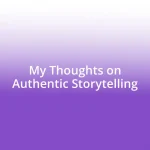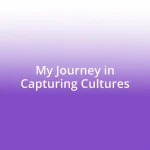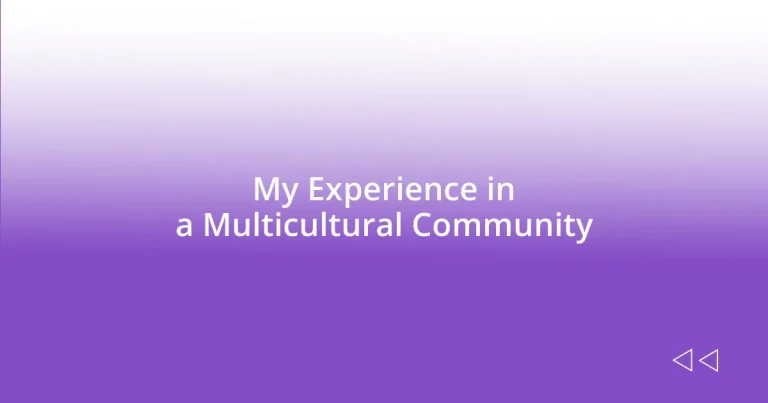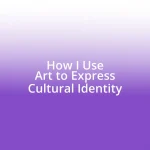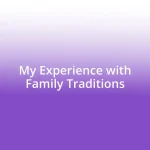Key takeaways:
- Connecting with diverse cultures enriches personal perspectives and fosters empathy through shared stories and experiences.
- Cultural awareness enhances communication, builds respect, and strengthens community bonds, creating a more cohesive society.
- Active listening and engagement are crucial in challenging stereotypes and understanding different viewpoints within multicultural communities.
- Participating in community events allows for the celebration of diversity and the creation of meaningful connections through shared activities.
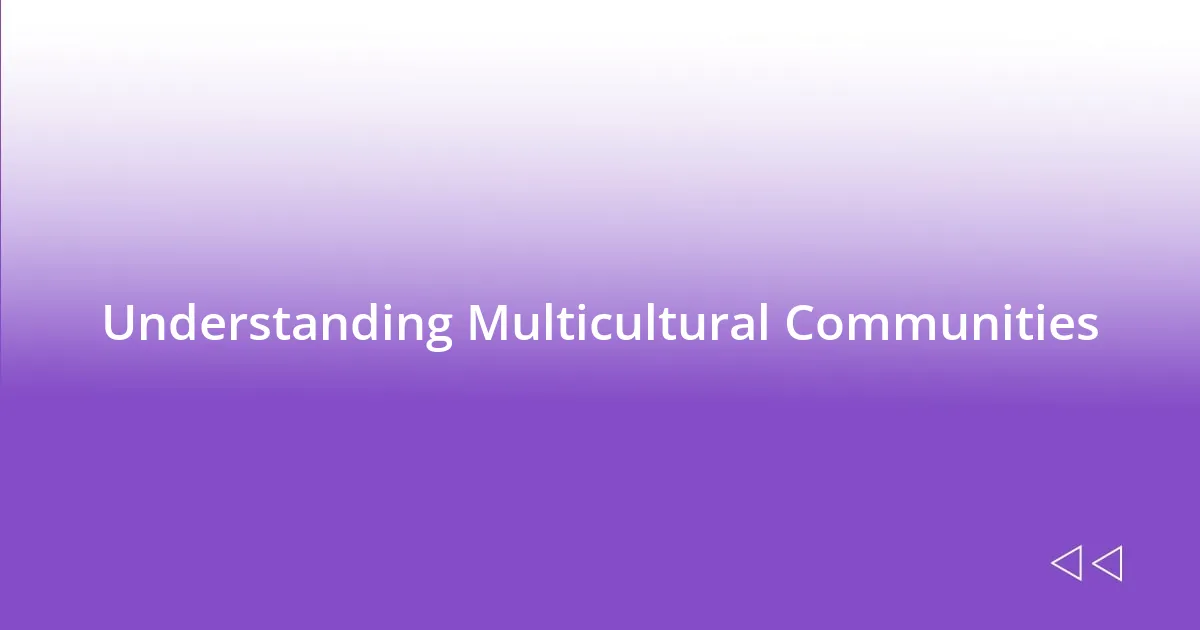
Understanding Multicultural Communities
I remember walking through my neighborhood, where every turn brought a new culture to life—colorful festivals, inviting aromas of different cuisines, and the sounds of various languages. It hit me one day just how vibrant a multicultural community truly is; it’s like being part of a living tapestry where every thread adds depth and richness. How often do we pause to appreciate the stories each person carries from their homeland?
In my experience, connecting with individuals from various backgrounds has opened my eyes to different perspectives. One time, I shared a meal with a friend from India who taught me about Diwali, the Festival of Lights. As we swapped traditions and stories, I couldn’t help but think—aren’t these shared moments what make us all human?
Living in a multicultural environment also brings challenges that require understanding and empathy. I recall a heated discussion about cultural norms that initially felt divisive, yet we ended up finding common ground through open dialogue. It made me wonder: how can we bridge our differences and build a community that celebrates diversity rather than shies away from it?
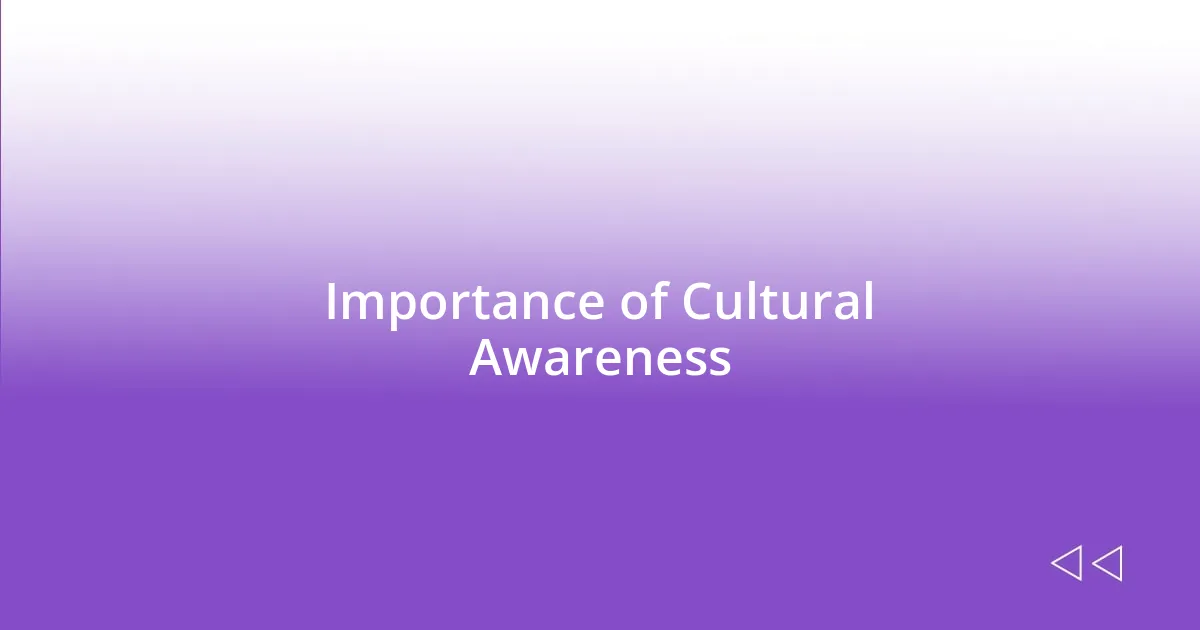
Importance of Cultural Awareness
Cultural awareness goes beyond mere acknowledgment; it’s about truly understanding and appreciating the differences that make us unique. I vividly remember attending a local cultural fair where I interacted with individuals whose experiences differed vastly from my own. Listening to their stories made me realize how crucial it is to embrace diversity, as it fosters a sense of belonging and unity amid our differences.
Here are some reasons why cultural awareness is vital:
- Enhances Communication: Understanding diverse backgrounds leads to clearer, more effective conversations.
- Fosters Respect: When we appreciate others’ cultures, we cultivate mutual respect, reducing biases and stereotypes.
- Encourages Collaboration: Cultural awareness in a team setting encourages diverse ideas, leading to more innovative solutions.
- Promotes Empathy: Engaging with varied perspectives helps us develop emotional intelligence and compassion for others’ experiences.
- Strengthens Community Bonds: Cultivating cultural understanding builds trust and a sense of shared purpose among community members.
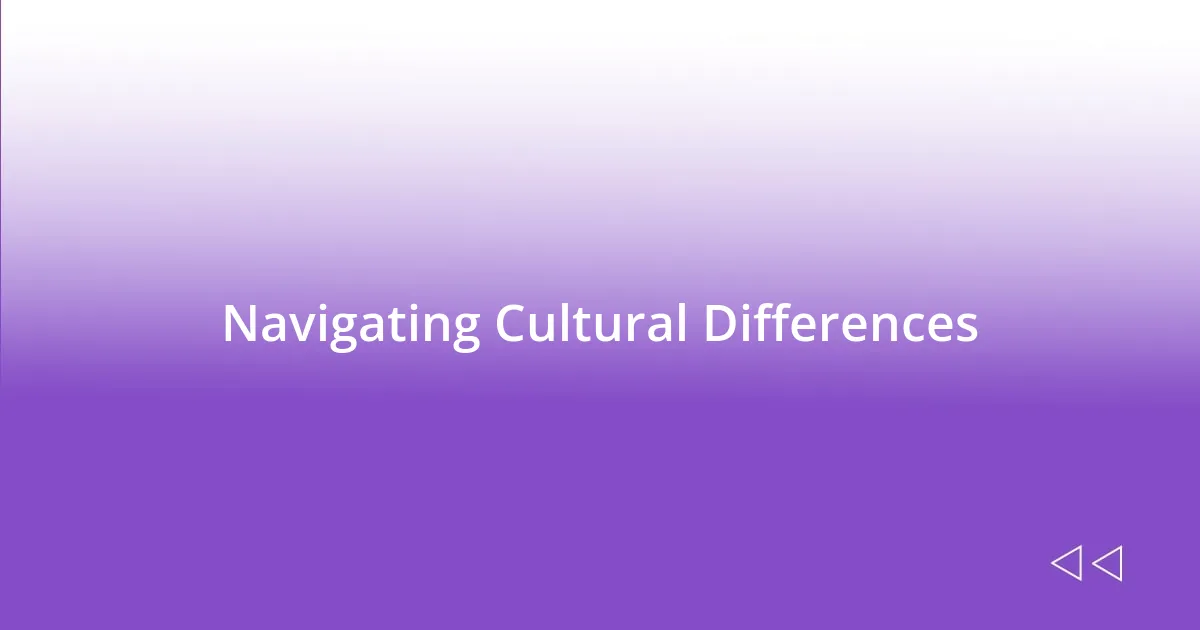
Navigating Cultural Differences
Navigating cultural differences can be one of the most enlightening experiences in a multicultural community. I remember one afternoon at a neighborhood potluck where each dish told a story. As I tasted a spicy dish from a new friend’s homeland, I could feel the warmth and care poured into every ingredient. It struck me how food transcends language and becomes an emotional bridge that connects us.
There are moments of confusion, too. I faced some misunderstandings during a community meeting where norms varied from one culture to another, leading to unintended tension. I quickly learned that asking questions and showing curiosity was key to navigating those differences. It’s fascinating how the willingness to learn and adapt can transform a potentially awkward situation into a valuable exchange of ideas.
To further illustrate how cultural differences can vary, here’s a comparison of communication styles that highlight the impact of cultural backgrounds on interactions:
| Cultural Trait | High-Context Cultures | Low-Context Cultures |
|---|---|---|
| Communication Style | Relies heavily on implicit messages and non-verbal cues | Prioritizes explicit and direct communication |
| Examples | Asian and Arab cultures, where the environment signifies much | Western cultures, such as the U.S. and Germany, where clarity is crucial |
| Conflict Resolution | Prefers mediation and preserving harmony | Values open confrontation and problem-solving |
These observations serve as reminders that, while our differences can present challenges, they also offer incredible opportunities for growth and connection. Engaging in dialogue about our unique experiences makes navigating these cultural waters a meaningful journey.
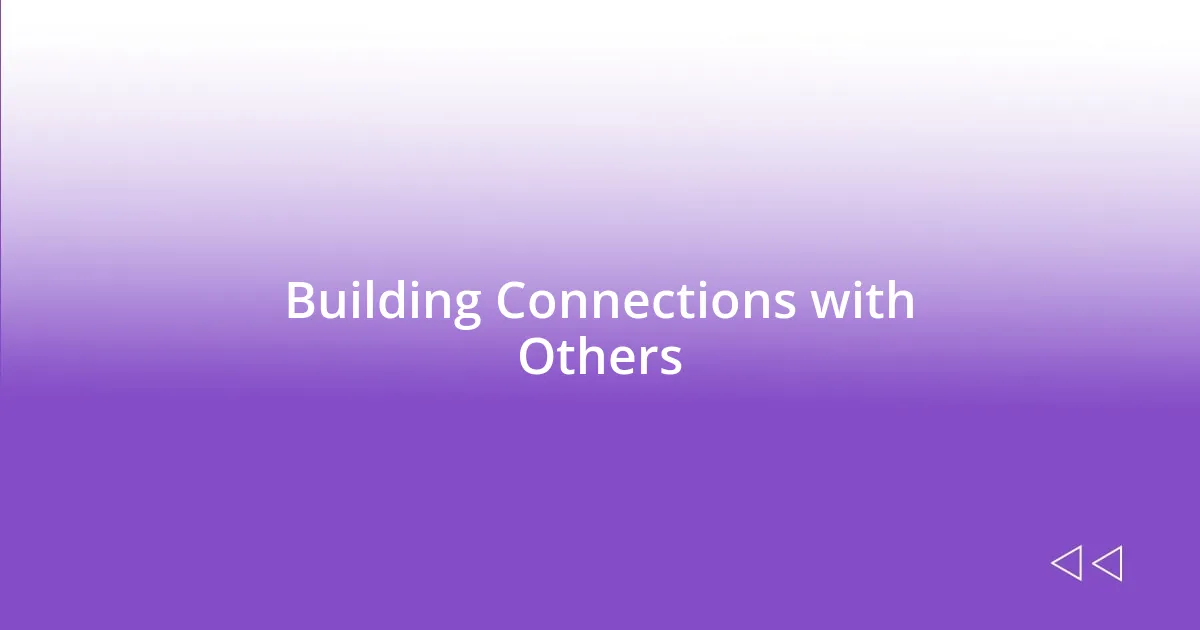
Building Connections with Others
Building connections with others in a multicultural community truly enhances our sense of belonging. I remember standing at a community gathering, watching people from different backgrounds exchange smiles and laughter, even if they spoke different languages. It made me wonder, what is it about shared experiences that break down barriers? I believe it lies in our innate desire to connect, to find common ground amid our unique stories.
Sometimes, the simplest gestures create the strongest bonds. I once volunteered at a local youth program, where I helped facilitate art activities that celebrated cultural expressions. As children laughed while painting flags that represented their heritage, I realized how creativity transcends cultural differences. This shared joy was a reminder that building connections doesn’t have to be complicated; sometimes, it’s as easy as coming together to create something beautiful.
However, I’ve also encountered moments of disconnect that revealed the importance of active listening. During a discussion on community issues, I noticed one participant feeling unheard as others dominated the conversation. It struck me how valuable it is to ensure every voice is included. By fostering open dialogue and making space for diverse perspectives, we can bridge gaps and strengthen our connections, ultimately creating a richer community experience for everyone involved.
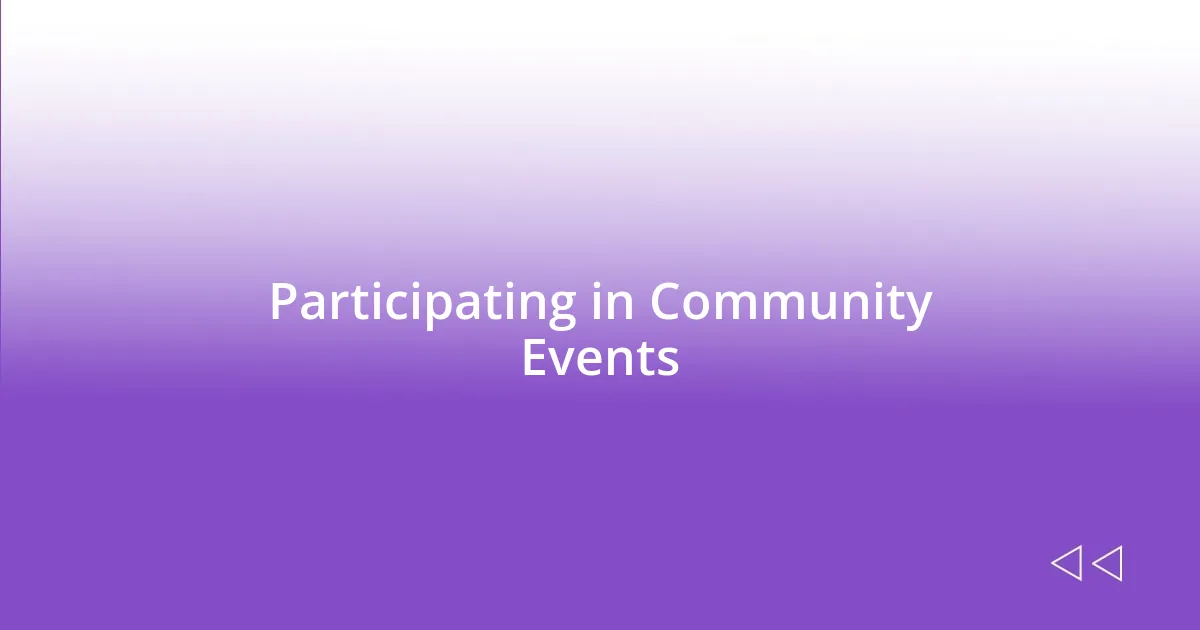
Participating in Community Events
Participating in community events has been a transformative experience for me. I vividly recall joining the annual multicultural festival, where vibrant music, food stalls, and dance performances filled the air. It was exhilarating to watch a traditional dance from a culture I had never encountered before; I felt both mesmerized and inspired. In those moments, I was reminded that each event offers a unique glimpse into a world of customs and traditions, igniting a curiosity that keeps me coming back for more.
One unforgettable moment occurred during a family-friendly sports day organized by our community center. As teams of diverse backgrounds competed in friendly matches, laughter echoed in the air, blending cultures seamlessly. I remember helping a young boy tie his shoelaces before a soccer match; he looked up at me with a broad smile, and in that instant, I understood that our shared excitement was more powerful than any language barrier. Isn’t it fascinating how these simple acts of kindness can create instant bonds, reminding us that we’re all part of something larger?
However, I’ve also seen the challenges of organizing such diverse gatherings. I volunteered to help coordinate an event, managing various cultural representatives and their unique needs. It was a delicate balance, as some preferred early planning while others embraced spontaneity. I quickly learned that flexibility and empathy are crucial, as everyone brought their own expectations to the table. This taught me that true participation means listening and adapting, ensuring that every voice feels valued in the collective joy of our multicultural experiences.
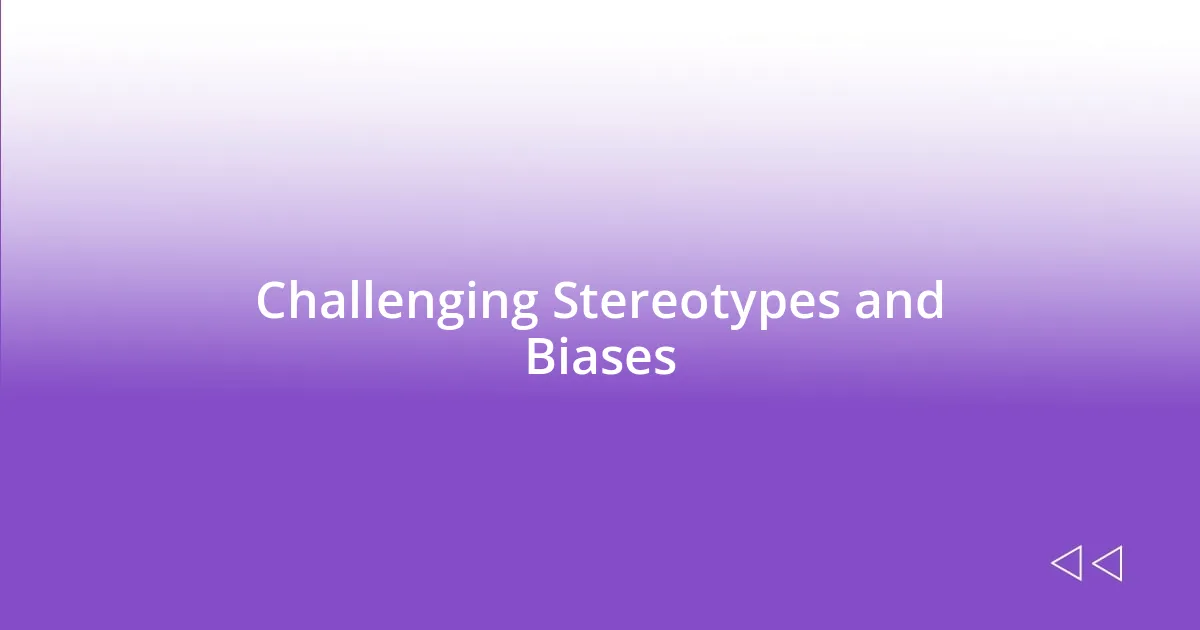
Challenging Stereotypes and Biases
Challenging stereotypes and biases is an ongoing journey that we must all navigate. I recall a discussion I had during a community potluck, where an older gentleman shared his experience of being overlooked in job opportunities simply because of his background. Hearing his story made me realize just how deeply rooted these biases can be. Why is it that preconceived notions often overshadow individual capabilities? That evening, I felt compelled to confront my own assumptions and examine how they might have unconsciously influenced my interactions with others.
There was a time when I attended a workshop focused on cultural empathy, and I found myself sitting next to a participant who had a very different perspective on a controversial topic. Initially, I was hesitant to engage, fearing that our differing views would lead to conflict. But ultimately, I chose to listen deeply instead of reacting. Sharing our stories revealed common experiences of struggle and resilience. It struck me then: what if we all took the time to truly hear each other? By peeling back the layers of our biases, we can discover shared humanity even in the most unexpected places.
Working as a mentor in a youth program offered me another lens to challenge biases. I remember the moment a teenage girl bravely shared her story about facing discrimination in school. The courage it took for her to speak up left an impression on me. It reminded me that our communities are woven with experiences often hidden beneath the surface. How many stories go untold because of fear of judgment? Encouraging open conversations not only fosters understanding but empowers others to share, enriching our multicultural tapestry in ways we may never have imagined.
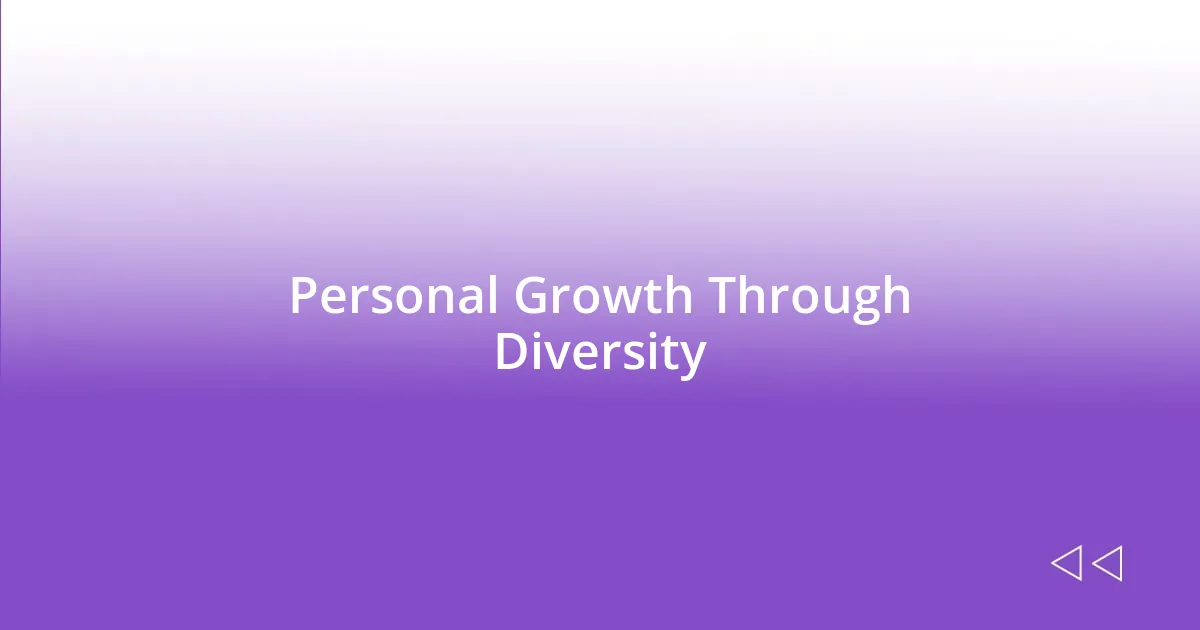
Personal Growth Through Diversity
Embracing the diversity around me has been a catalyst for personal growth. I remember sitting at a coffee shop with a friend from a different cultural background, and we began sharing our childhood stories. The richness of her experiences made me reflect on my own upbringing in ways I had never considered before. It was eye-opening to realize that while our paths were different, the emotions we felt—joy, sadness, even resilience—were fundamentally the same. How fascinating it is that our differences can lead to such profound connections!
One snowy evening during a community gathering, I found myself participating in storytelling circles where individuals shared tales from their heritage. Listening to a woman recount her family’s journey to find a new home made me feel a wave of empathy wash over me. It struck me how our individual narratives are woven together to create a vivid tapestry of community. In that moment, I thought, what if we all made a conscious effort to share our stories more often? I believe it could foster a deeper understanding among us and dismantle the barriers that often keep us apart.
Moreover, my involvement in a mentorship program for immigrant families opened my eyes to the significance of cultural exchange for personal transformation. Guiding young minds facing the dual pressures of adaptation and acceptance was not just about offering support; it allowed me to confront my own biases and broaden my worldview. I vividly remember a teenager expressing her dreams of pursuing science, despite feeling invisible in her new environment. Listening to her aspirations ignited a sense of responsibility within me to help create opportunities that uplift voices that often go unheard. Isn’t it empowering to know that through one-on-one interactions, we can influence another person’s journey? It’s these moments of shared growth that highlight the undeniable impact of diversity in shaping who we are.







